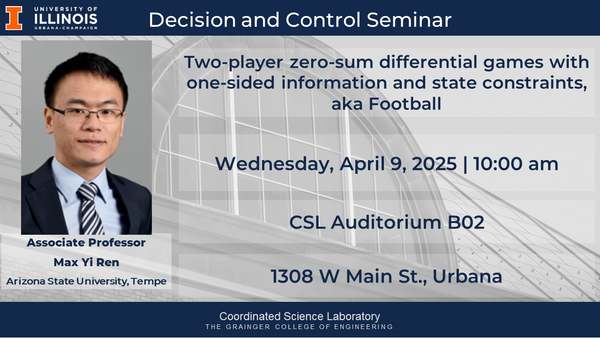
Seminar with Speaker Yi Ren
- Event Type
- Seminar/Symposium
- Sponsor
- Decision and Control Laboratory, Coordinated Science Laboratory
- Location
- Reception outside B02 at 9:30 am followed by Seminar in B02 at 10:00 am
- Date
- Apr 9, 2025 10:00 - 11:00 am
- Views
- 215
- Originating Calendar
- CSL Decision and Control Group
Abstract
Enabling embodied intelligence requires agents to plan according to unknown and potentially adversarial intents of other interacting agents. This talk will focus on one of such scenarios where theory and methods are underdeveloped. Specifically, we study zero-sum differential games with state constraints and one-sided information, where the informed player (Player 1) has a categorical payoff type unknown to the uninformed player (Player 2). The goal of Player 1 is to minimize his payoff without violating the constraints, while Player 2 either aims to violate the state constraints or, failing that, maximize the payoff. Examples of such games include man-to-man matchup in football and missile defense scenarios. Due to the zero-sum nature, Player 1 may need to delay information release or even manipulate Player 2's belief to take full advantage of information asymmetry, while Player 2's strategy is to minimize the worst-case risk. Existing SOTA solvers, e.g., for Poker, are not scalable to continuous action spaces as is often the case in control and robotics settings. We will discuss an effective solution to this challenge that leverages unique structural properties of the game.
Biography
Dr. Yi Ren is an Associate Professor with the Department of Mechanical and Aerospace Engineering at Arizona State University. His research spans a range of topics at the intersection of machine learning and engineering, with current focuses on differential game theory, physics-informed machine learning, and generative model attribution. He has published in both machine learning conferences, including ICLR and ICML, and engineering journals, such as IEEE Transactions on Robotics and Acta Materialia. Dr. Ren received his Ph.D. in Mechanical Engineering from the University of Michigan in 2012 and his Bachelor’s degree in Automotive Engineering from Tsinghua University in 2007. Outside of research, he enjoys playing soccer and spending time with kids.